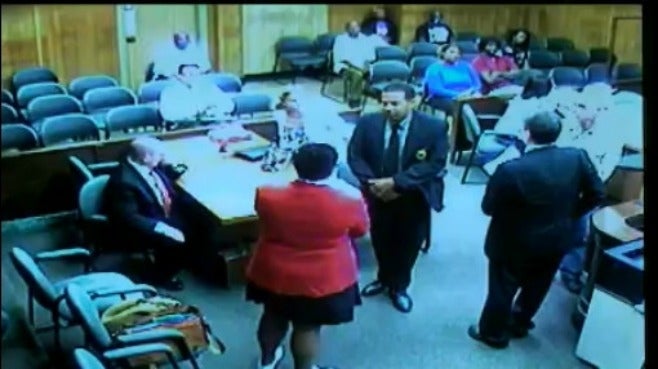Attorney refuses to remove Black Lives Matter pin, taken into custody
YOUNGSTOWN, Ohio (WKBN) – An attorney was removed from court and taken into custody after a judge declared her in contempt for refusing to take off a Black Lives Matter pin.
Youngstown Municipal Court Judge Robert Milich said Attorney Andrea Burton was in contempt of court for refusing to remove the pin in his courtroom as instructed. Burton was sentenced to five days in jail, but she has been released on a stay while an appeal is underway.
Burton will stay out of jail during the appeals process as long as she obeys Milich’s order not to wear items that make a political statement in court. If she loses her appeal, she will have to serve the five days in jail.
Milich said his opinions have nothing to do with his decision.
“A judge doesn’t support either side,” he said. “A judge is objective and tries to make sure everyone has an opportunity to have a fair hearing, and it was a situation where it was just in violation of the law,” he said.
The Youngstown branch of the National Association for the Advancement of Colored People (NAACP) said its legal counsel is monitoring the case closely as it may violate Burton’s civil rights.
A statement issued Friday from Youngstown NAACP President George Freeman, Jr.questioned whether Burton had violated the law. He has contacted the national NAACP’s legal office for assistance.
“We will do all that the NAACP Youngstown can do to ensure that Attorney Burton’s Constitutional rights are not being violated,” he said.
Attorney and community activist Kim Akins said she is worried about what happened.
“No one wearing an American flag button, no one wearing a crucifix or a Star of David would be removed, so why this particular statement bothered him so much is bothersome,” she said.
The judge said his ruling is based on Supreme Court case law in which a judge can prohibit symbolic political expression in courtrooms, even if it’s not disruptive.
“There’s a difference between a flag, a pin from your church or the Eagles and having a pin that’s on a political issue,” Milich said.
Legal analysts say judges have free reign when it comes to what’s said, or worn, in their courtrooms.
“The judge has the right in any circumstance that they think that some issue or matter will be disruptive to the court or a distraction to the court, they can ask that individual to remove that object,” said Matt Mangino.
Mike Brickner, senior policy director for the American Civil Liberties Union of Ohio, said he didn’t know enough about the particular case to comment on it, but in general, judges are given a wide latitude in determining what can be worn in a courtroom.
“There have been cases in the past when people have been given contempt of court for refusing to comply with a judge’s order to remove an article of clothing that may have a message on it. Many times this has been done to retain the defendant’s right to a fair trial,” Brickner said via email Friday.
Brickner said, however, a judge’s restrictions on what people may wear must be reasonable and fairly applied.
When contacted Friday, Burton and her attorney refused to comment on the case.
